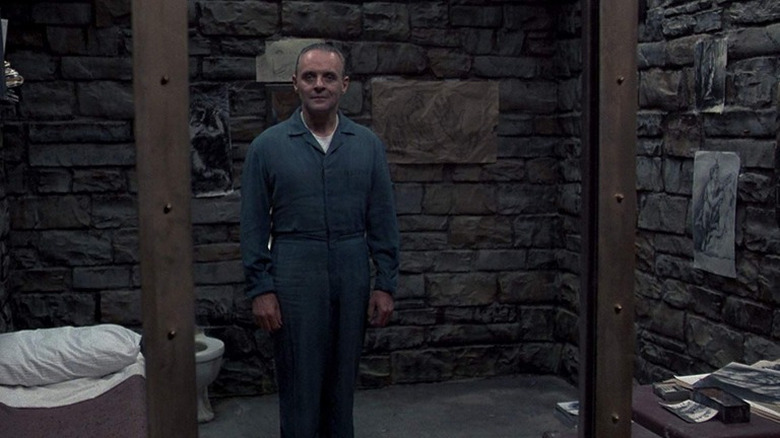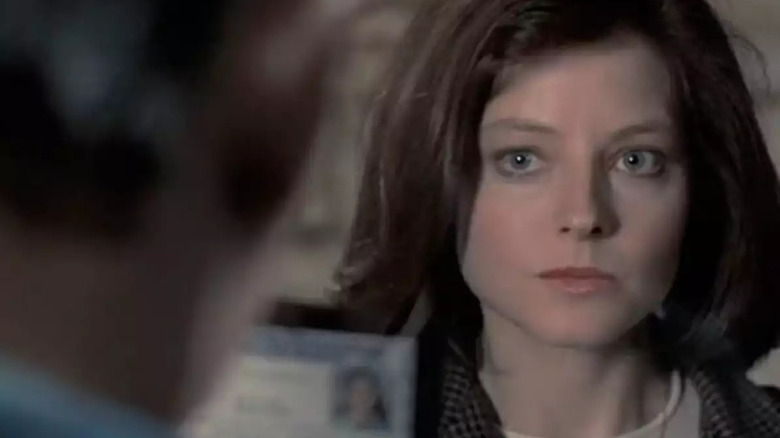The Silence Of The Lambs Scene That Truly Terrified Jodie Foster
In 1991, "The Silence of the Lambs" was the third film to sweep the "Big 5" at the Academy Awards, picking up golden statues for Best Picture, Best Director, Best Actor, Best Actress, and Best Screenplay. The movie holds the same honors as "It Happened One Night" in 1934 and "One Flew Over the Cuckoo's Nest" in 1974; it's not a bad feat for a movie about an FBI agent/cannibal tag team hunting down a serial killer.
Jonathan Demme's thriller has scares, creeps, and unorthodox wine pairings in its tale of young Clarice Starling (Jodie Foster), a fledgling FBI agent tasked with the capture of the killer "Buffalo Bill" (Ted Levine), so named for his penchant for skinning his women victims. Starling seeks the help of the incarcerated Dr. Hannibal Lecter (Anthony Hopkins), a psychiatrist with his own m.o. that earned him the nickname "Hannibal the Cannibal." As Lecter, Anthony Hopkins accesses a monstrosity through tranquility, essaying Peter Lorre's silent villain Hans Beckert in Fritz Lang's "M" instead of a neurotic Norman Bates or an unhinged Patrick Bateman. It's an incredible performance, one that earned Hopkins a few statues and awards, but no one was more affected by his turn as Lecter than his co-star.
Speaking with Vanity Fair, Jodie Foster (who already had prestige to her name due to her 1998 Best Actress Oscar for Jonathan Kaplan's courtroom drama "The Accused") recounts her experience with Hopkins. For a good run of the film, Agent Starling and Dr. Lecter are separated by a pane of glass that makes the barrier of his cell, creating a distance that infused itself into their respective performances. It's eeriness is most apparent in the duo's first scene together, when Agent Starling meets Lecter face-to-face. Here's what Foster had to say about it:
"We met at a reading. I didn't really get a proper meet with Tony. So we're sitting across from each other, and he launches in, and we start the reading. And I was just petrified. [Laughs.] I was kind of too scared to talk to him after that."
"Play him nice."
Foster elaborates that she "still kept that kind of hold-your-breath feeling about the character just from that first reading." For Hopkins to turn the screw so deeply despite the lack of ferocity or physical closeness is a testament to the intensity of the performance, something that was very intentional. Hopkins explains:
"The way Ted Tally had written it—it was so indelible in my mind. [Laughs.] I don't know what it is that's in my brain—I'm fairly normal most of the time—but I know what scares people, and I believe that stillness is the key. You know, we don't look at anyone too long. We look away, or we laugh to disarm ourselves. But if you stare at someone for more than 10 seconds, it scares them. And you can do it, you can test people. I knew instinctively that I should be absolutely still. All the talk about 'He's a monster...' I thought, Well, go to the opposite. Play him nice."
And nice he does play it, whispering where others might shout and opting for delicacy over brutality. As Hans Beckert whistles Edvard Grieg "In the Hall of the Mountain King" while he prowls for child victims, so does Lecter sway to a Bach aria with a straight razor as he makes quick work of two cops. It's enough to drive any co-worker of his mad, and Starling got off fairly easy.
Let's hope the lambs have stopped screaming for Foster since then.

